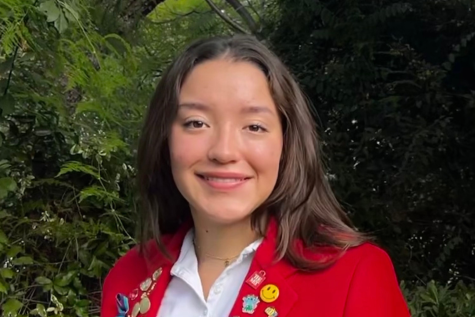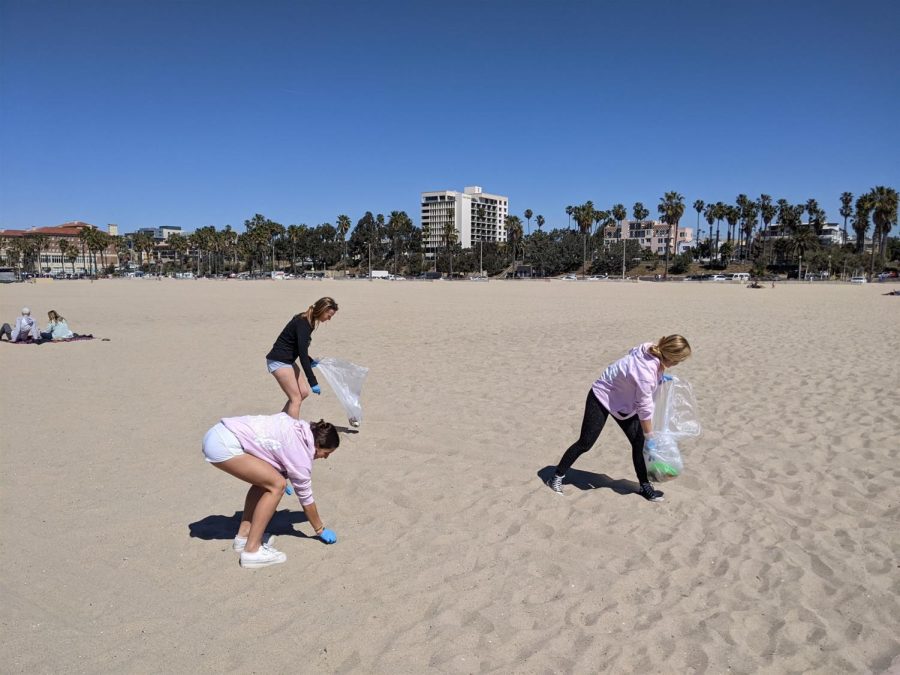The authenticity of service on the Hill
Aloha Kai members Meghan Garrity, Josie Perkins and Gianna Sabatella, all class of 2023, pick up litter on the beach on a weekend day.
An eager pack of Tologs equipped with gloves, shovels and trash bags jumps out of the FSH shuttle van after a one-hour drive to the beach. As the sea breeze hits their warm faces, they begin their trek in the sand on their hunt for trash. After a few hours of picking up litter, the club members head home exhausted from what their day of service has brought them.
Service is one of the four Dominican Pillars, which also include study, prayer and community. These Pillars are guiding principles for life at Flintridge Sacred Heart. Flintridge Sacred Heart’s approach to community service for Tologs is the school’s Dominican Service Program, which focuses on outreach service and service-learning. Outreach service is helping others through direct involvement in communities through projects like beach clean-ups, while service-learning is a more involved process that starts with researching why Tologs are helping a certain community before going into that community to put that research to work.
Service hours through both service-learning and outreach service are implemented in various ways, including through clubs, co-curriculars and affinity groups.
“We have a requirement for a grade nine [and 10] service; juniors and seniors intertwine service in religion class and in their [research projects]. All co-curriculars are required to do one service,” Director of Community Life Dr. Juli James said.
Students at FSH appreciate the service program because of the opportunities provided for Tologs to develop as people and help communities in need.
“Service has brought about a lot of transformative experiences for all of us, it gives us joy, and we met a lot of great people while doing something good for the community around us,” Faith Blea ‘22, who is the service chair of Round Square, an international club for schools that features a service component, said.
Service makes a difference in those communities, and it helps Tologs grow spiritually. It also, however, boosts their college applications.
The challenge that FSH’s program faces is making sure the service done is authentic and consistent with the values associated with the Dominican Pillars. The challenge is making sure that students are not doing service to make their college applications look good.
“The fact that we have required service does make it a little bit fake for some people. I think it’s good that they’re doing the service, obviously,” Cassie Huston ’23 said. “But we could still work on why we’re doing the service [and ensure] it comes from the right place.”
Sometimes service is done to put on college applications, and because of this, some Tologs see the motivations for volunteering as less than genuine.
“I was talking with my college counselor and he said that, apparently, if [college admissions] just see you start doing service junior year, it’s obvious that you’re just doing it for college,” Huston said.
Administrators on the Hill are attempting to address the challenge of inauthentic motivations to complete service. They want to push students to seek service opportunities they care about so that they are fully invested in the cause and want to help others rather than do service for completion and academic reward.
“Service should be from heart and head. You’re giving because you want to; it changes you in some way. You are learning something about the world, about the community by doing service,” Dr. James said.
One method to encourage investment in service at FSH is through research that allows students to understand the significance of their service.
“We see the most value in what is called service-learning, which is a little bit different from service work. It’s a combination of what we think traditionally of service work combined with learning about the root causes of the service need,” Director of Library Services and Research Program Ms. Nora Murphy said. “When you’re just doing service work without having investigated the need, the community, the root cause, it doesn’t create a lasting desire to continue with that level of service.”
At FSH, every senior takes a class with a research component, such as Engineering for Social Good or Faith and Media. In these classes, Tologs research the root cause of an issue that affects our world. Researching solutions to problems in the real world in the classroom through research is considered its own form of service-learning.
“In the [class research projects], you’re learning about a social issue, a problem facing our world, and then your service is how can I help fix it or meet the needs of that community I’m learning about?” religious studies teacher Ms. Kristina Ortega said.
Whether service is done through research or out in communities, it is supposed to help people in need. FSH’s service program that has been integrated throughout the classes, co-curricular and clubs has one goal in mind, to help as many people and causes as possible.
“[The Dominican Service program on the Hill] really striv[es] for projects that everyone can easily participate in for the good of giving back to charity and our local communities,” Blea said. “We strive really to build community through service and make this a key part of the school’s lifestyle.”

Siena Urquiza, a senior, is the Editor-in-Chief of Veritas Shield. This year marks her third year with the Shield. Siena cannot wait to make her mark on...

